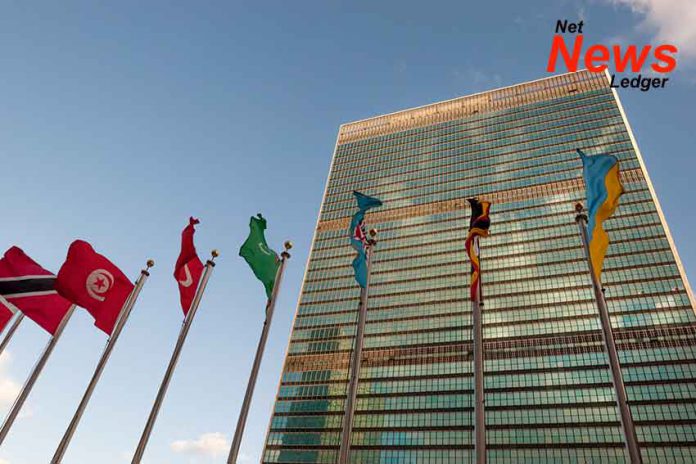
NEW YORK – Anishinabek Nation Grand Council Chief Reg Niganobe joined an international delegation including representatives from the Bay Mills Indian Community, Center for International Environmental Law, EarthRights International, and Environmental Defence Canada this week at the 22nd United Nations Permanent Forum on Indigenous Issues (UNPFII) carrying a strong message to the governments of Canada and the United States.
“As Anishinaabe people, we worry that a lack of attention to the guidance and wisdom of Indigenous people will lead to more poor policies for human health and well-being. We are proud to stand alongside our international Indigenous brothers and sisters and call for a sustainable future based on Indigenous leadership,” states Grand Council Chief Niganobe. “It is important to engage on this international stage to monitor how state actors will use novel or complex jurisdictions, like data governance or the implementation of Free, Prior, and Informed Consent (FPIC), to push through agendas that serve corporations and not people.”
The UNPFII’s theme, “Indigenous Peoples, human health, planetary and territorial health and climate change: a rights-based approach,” is befitting as First Nations across Turtle Island are impacted by the consequences of foreign policies and governments that do not align with traditional governance and encroach on both human and inherent rights. For example, the Canadian federal government continues to protect Enbridge Energy’s Line 5 pipeline, which transports millions of gallons of crude oil and natural gas liquids through the heart of the Great Lakes, despite the demand to decommission from Indigenous leaders from across Turtle Island.
“Anishinaabe peoples are peoples of the Great Lakes basin. The international border creates an artificial divide between our American and Canadian families. At the United Nations, we will continue to seek clarity on the application of principles of Free, Prior, and Informed consent when it comes to state actors and Indigenous peoples that do not live within their domestic jurisdiction,” states Grand Council Chief Niganobe. “For example, Line 5 crosses through Wisconsin and Michigan, and then terminates in Ontario. Should Canada, as a signatory to UNDRIP, be informed about the need to ensure that Indigenous bands in America must also be consulted in the creation, monitoring, and decommissioning of major energy projects? As many Anishinaabe have stated, Ngo Dwe Waangizid Anishinaabe— One Anishinaabe Family — no matter if we are US federally-recognized tribes or Canadian Indian Act bands.”
Policing remains a core issue for Indigenous peoples, including the ongoing over-policing and over-incarceration of Indigenous people, 2SMMIWG concerns, and the deaths of young Indigenous peoples in Thunder Bay, Ontario. There have been a number of expert reports presented that require a strong level of commitment to implement the recommendations in order to remedy the ongoing human rights violations situation.
“We encourage the government of Canada and the province of Ontario to follow the direction given by those reports as we continue to monitor the situation and advocate for safer living conditions for our own Anishinaabe people and other Indigenous people in Thunder Bay,” states Grand Council Chief Niganobe. “I’d like to highlight that the Ontario First Nations Police Chiefs have filed a complaint with the Canadian Human Rights Commission on the inequitable funding of Indigenous police services. We’ve seen the value of Indigenous police forces being run for and by the community, they are more responsive and understanding of intergenerational trauma and how that leads to more Indigenous peoples being in contact with the police.”
Current data practices, both in force and draft legislation, do not align with the Anishinabek Nation sacred duty to protect, preserve, and ensure the well-being of the peoples of the seventh generation.
“We at the Anishinabek Nation are also concerned with Safeguarding Anishinabek sovereignty, possession, and jurisdiction over data, genomics, omics, and artificial intelligence,” adds Grand Council Chief Niganobe. “We are worried that data priorities that weaponize data could create further dispossession at the expense of our inherent rights.”
Grand Council Chief Niganobe also joined the Assembly of First Nations delegation for a press conference on Day 3 of the UNPFII to highlight Indigenous priorities in Canada. The delegation included: National Chief RoseAnne Archibald; Chief of Tl’etinqox First Nation Joe Alphonse; Vice Chief of Federation of Indigenous Sovereign Nations Aly Bear; Assembly of First Nations Youth Council Members Taylor Behn-Tsakoza & Ashley Daniels; and former Neskonlith Band Chief and former Secretary Treasurer of the Union of British Columbian Indian Chiefs Judy Wilson.



